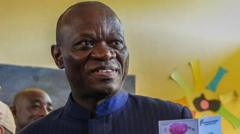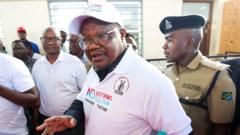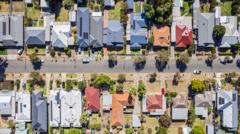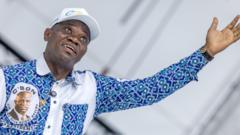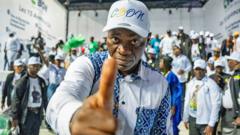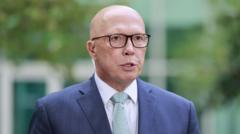Gabonese citizens are preparing to vote for a new president in their first democratic election since the military coup, with seven candidates vying for the position.
Gabon Votes: A New Chapter Following Army Coup
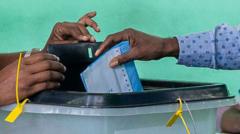
Gabon Votes: A New Chapter Following Army Coup
Citizens head to the polls in Gabon for their first presidential election since the military takeover.
In a significant shift from decades of Bongo family leadership, Gabon is gearing up for a crucial election now that the populace is set to cast their votes for the first time since the military coup that ousted President Ali Bongo less than two years ago. General Brice Oligui Nguema, the orchestrator of the coup, has transformed the country's political landscape, positioning himself as a candidate after modifying the constitution to facilitate his participation in the election.
Voters will choose from eight candidates, including Gninga Chaning Zenaba, the only woman in the race. Notable competitors include Alain Claude Bilie-by-Nze, a former Prime Minister affiliated with the previous regime, alongside other candidates linked to the ousted political party. Amid the political maneuvers, the electoral process has faced accusations of bias, particularly towards Oligui Nguema, who many critics believe has leveraged the transitional climate to assure his dominance.
With almost one million eligible voters, both locally and in the diaspora, the election results are expected to begin trickling in as soon as Sunday. The campaign saw Oligui Nguema's posters and slogans saturate Libreville, while his rivals struggled to gain visibility. Voter sentiments reflect a desire for genuine reform and a move away from past corruption. Citizens hope for improved governance, social equity, and a concerted focus on alleviating the high unemployment rates that affect their communities.
As the polls close today, Gabon faces a pivotal moment in its journey towards stability and progress. The new administration will bear the weight of public expectations and a demand for a prosperous future.
Polling will cease at 18:00 local time (17:00 GMT) as Gabon looks towards a potential dawn of new political leadership.
Voters will choose from eight candidates, including Gninga Chaning Zenaba, the only woman in the race. Notable competitors include Alain Claude Bilie-by-Nze, a former Prime Minister affiliated with the previous regime, alongside other candidates linked to the ousted political party. Amid the political maneuvers, the electoral process has faced accusations of bias, particularly towards Oligui Nguema, who many critics believe has leveraged the transitional climate to assure his dominance.
With almost one million eligible voters, both locally and in the diaspora, the election results are expected to begin trickling in as soon as Sunday. The campaign saw Oligui Nguema's posters and slogans saturate Libreville, while his rivals struggled to gain visibility. Voter sentiments reflect a desire for genuine reform and a move away from past corruption. Citizens hope for improved governance, social equity, and a concerted focus on alleviating the high unemployment rates that affect their communities.
As the polls close today, Gabon faces a pivotal moment in its journey towards stability and progress. The new administration will bear the weight of public expectations and a demand for a prosperous future.
Polling will cease at 18:00 local time (17:00 GMT) as Gabon looks towards a potential dawn of new political leadership.






